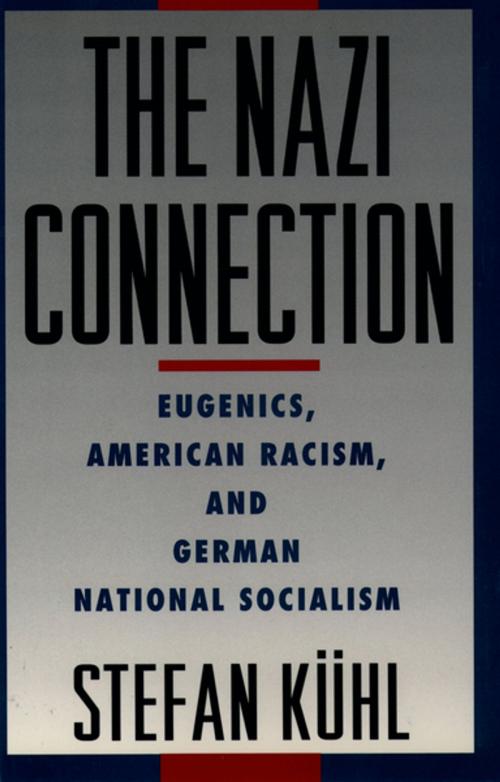The Nazi Connection
Eugenics, American Racism, and German National Socialism
Nonfiction, Science & Nature, Science, Biological Sciences, Genetics, History, Germany, Social & Cultural Studies, Social Science, Sociology| Author: | Stefan Kuhl | ISBN: | 9780199882106 |
| Publisher: | Oxford University Press | Publication: | February 14, 2002 |
| Imprint: | Oxford University Press | Language: | English |
| Author: | Stefan Kuhl |
| ISBN: | 9780199882106 |
| Publisher: | Oxford University Press |
| Publication: | February 14, 2002 |
| Imprint: | Oxford University Press |
| Language: | English |
When Hitler published Mein Kampf in 1924, he held up a foreign law as a model for his program of racial purification: The U.S. Immigration Restriction Act of 1924, which prohibited the immigration of those with hereditary illnesses and entire ethnic groups. When the Nazis took power in 1933, they installed a program of eugenics--the attempted "improvement" of the population through forced sterilization and marriage controls--that consciously drew on the U.S. example. By then, many American states had long had compulsory sterilization laws for "defectives," upheld by the Supreme Court in 1927. Small wonder that the Nazi laws led one eugenics activist in Virginia to complain, "The Germans are beating us at our own game." In The Nazi Connection, Stefan Kühl uncovers the ties between the American eugenics movement and the Nazi program of racial hygiene, showing that many American scientists actively supported Hitler's policies. After introducing us to the recently resurgent problem of scientific racism, Kühl carefully recounts the history of the eugenics movement, both in the United States and internationally, demonstrating how widely the idea of sterilization as a genetic control had become accepted by the early twentieth century. From the first, the American eugenicists led the way with radical ideas. Their influence led to sterilization laws in dozens of states--laws which were studied, and praised, by the German racial hygienists. With the rise of Hitler, the Germans enacted compulsory sterilization laws partly based on the U.S. experience, and American eugenists took pride in their influence on Nazi policies. Kühl recreates astonishing scenes of American eugenicists travelling to Germany to study the new laws, publishing scholarly articles lionizing the Nazi eugenics program, and proudly comparing personal notes from Hitler thanking them for their books. Even after the outbreak of war, he writes, the American eugenicists frowned upon Hitler's totalitarian government, but not his sterilization laws. So deep was the failure to recognize the connection between eugenics and Hitler's genocidal policies, that a prominent liberal Jewish eugenicist who had been forced to flee Germany found it fit to grumble that the Nazis "took over our entire plan of eugenic measures." By 1945, when the murderous nature of the Nazi government was made perfectly clear, the American eugenicists sought to downplay the close connections between themselves and the German program. Some of them, in fact, had sought to distance themselves from Hitler even before the war. But Stefan Kühl's deeply documented book provides a devastating indictment of the influence--and aid--provided by American scientists for the most comprehensive attempt to enforce racial purity in world history.
When Hitler published Mein Kampf in 1924, he held up a foreign law as a model for his program of racial purification: The U.S. Immigration Restriction Act of 1924, which prohibited the immigration of those with hereditary illnesses and entire ethnic groups. When the Nazis took power in 1933, they installed a program of eugenics--the attempted "improvement" of the population through forced sterilization and marriage controls--that consciously drew on the U.S. example. By then, many American states had long had compulsory sterilization laws for "defectives," upheld by the Supreme Court in 1927. Small wonder that the Nazi laws led one eugenics activist in Virginia to complain, "The Germans are beating us at our own game." In The Nazi Connection, Stefan Kühl uncovers the ties between the American eugenics movement and the Nazi program of racial hygiene, showing that many American scientists actively supported Hitler's policies. After introducing us to the recently resurgent problem of scientific racism, Kühl carefully recounts the history of the eugenics movement, both in the United States and internationally, demonstrating how widely the idea of sterilization as a genetic control had become accepted by the early twentieth century. From the first, the American eugenicists led the way with radical ideas. Their influence led to sterilization laws in dozens of states--laws which were studied, and praised, by the German racial hygienists. With the rise of Hitler, the Germans enacted compulsory sterilization laws partly based on the U.S. experience, and American eugenists took pride in their influence on Nazi policies. Kühl recreates astonishing scenes of American eugenicists travelling to Germany to study the new laws, publishing scholarly articles lionizing the Nazi eugenics program, and proudly comparing personal notes from Hitler thanking them for their books. Even after the outbreak of war, he writes, the American eugenicists frowned upon Hitler's totalitarian government, but not his sterilization laws. So deep was the failure to recognize the connection between eugenics and Hitler's genocidal policies, that a prominent liberal Jewish eugenicist who had been forced to flee Germany found it fit to grumble that the Nazis "took over our entire plan of eugenic measures." By 1945, when the murderous nature of the Nazi government was made perfectly clear, the American eugenicists sought to downplay the close connections between themselves and the German program. Some of them, in fact, had sought to distance themselves from Hitler even before the war. But Stefan Kühl's deeply documented book provides a devastating indictment of the influence--and aid--provided by American scientists for the most comprehensive attempt to enforce racial purity in world history.















